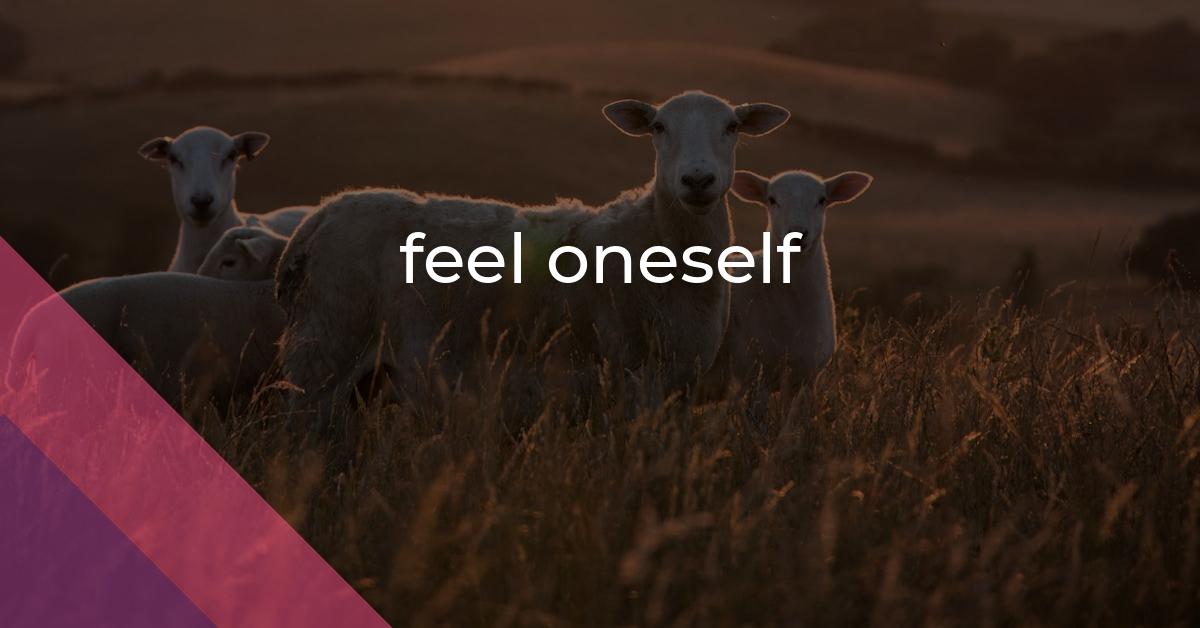feel oneself: Idiom Meaning and Origin
What does ‘feel oneself’ mean?
The idiom "feel oneself" means to feel normal, healthy, or back to one's usual self after a period of illness or discomfort. It suggests a return to physical or emotional well-being.

Idiom Explorer
The idiom "make oneself at home" means to make oneself feel comfortable and relaxed in someone else's house or any new environment.
The idiom "let oneself go" means to stop making an effort to maintain one's appearance or behavior, often resulting in a decline or deterioration in one's physical or emotional state.
The idiom "home sweet home" is used to express a feeling of comfort, familiarity, and contentment when one is back in their own home environment.
The idiom "get oneself together" means to regain composure or emotional stability after a period of confusion, distraction, or disorganization.
The idiom "full of oneself" means feeling excessively proud or self-centered, often to the point of arrogance or conceit.
The idiom "forget oneself" means to lose control of one's emotions or behavior, usually in a way that is unusual or inappropriate for the situation.
The idiom "find one's feet" means to become familiar with a new situation or environment and start to feel confident and comfortable in it.
The idiom "find oneself" means to discover or understand one's true identity, purpose, or place in life. It often refers to a process of self-discovery or self-reflection, where a person gains clarity about their values, goals, or beliefs.
The idiom "feel one's way" means to proceed cautiously or slowly, especially in an unfamiliar or uncertain situation, relying on instinct and experience to make progress.
Unveiling Inner Sensations
The idiom "feel oneself" is a commonly used expression in the English language. It is primarily used to describe a state of feeling physically or emotionally well or normal. The phrase is typically used in the reflexive form, as in "I don't feel myself today" or "She's not feeling herself lately."
One possible origin of this idiom can be traced back to the concept of personal identity. Feeling oneself implies a sense of alignment with one's own identity or experiencing a familiar and comfortable state. This idiomatic expression reflects an understanding of the complex nature of self-awareness and the connection between one's physical and emotional states.
The idiom "feel oneself" can also be interpreted as a metaphorical expression, referring to the ability to recognize and understand one's own emotions, desires, or needs. It suggests a degree of self-awareness and introspection, implying that one is in touch with their true feelings.
The related idiom "come to oneself" can be used to describe a situation where an individual regains consciousness or recovers from a state of confusion or disorientation. It emphasizes the idea of returning to a state of normalcy and being aware of one's surroundings and identity.
Similarly, the idiom "find oneself" can be related to "feel oneself" as both expressions highlight the importance of personal identity and self-awareness. "Find oneself" is often used to describe a process of self-discovery or self-realization, where an individual becomes aware of their true values, interests, or purpose in life.
The idiom "comfortable in one's own skin" also aligns with the concept of "feel oneself" as it pertains to a state of being at ease and confident with who one is. It emphasizes self-acceptance and self-assurance, highlighting the importance of embracing one's true identity.
Lastly, the idiom "get oneself together" can be connected to "feel oneself" as it denotes a state of regaining composure, stability, or emotional equilibrium. It implies taking the necessary steps to address one's emotions or life circumstances in order to feel more like oneself again.
While the exact origins of this idiom remain uncertain, its usage has been recorded in various literary works and cultural contexts throughout history. The phrase has been used in both formal and informal settings, indicating its widespread familiarity and acceptance among English speakers.
Furthermore, the idiom "feel oneself" can be seen as a reflection of the broader linguistic trend of using reflexive pronouns to express emotions, sensations, or states of being. Similar idiomatic expressions include "find oneself," "see oneself," or "know oneself," all conveying a sense of self-awareness and personal understanding.
The idiom "feel oneself" is not limited to any specific dialect or region, as it is commonly used across different English-speaking communities. Its versatility allows for its incorporation in various contexts, ranging from everyday conversations to literature, film, and other forms of artistic expression.
While the idiom "feel oneself" carries a straightforward and literal meaning, its significance extends beyond the literal interpretation. It explores the complex relationship between one's physical and emotional states, personal identity, and self-awareness. This idiom serves as a reminder of the intricacies of human experience and the profound impact our feelings can have on how we perceive ourselves and interact with the world.
Overall, the idiom "feel oneself" encapsulates the nuanced understanding of personal well-being, self-awareness, and emotional alignment. Its extensive usage and cultural relevance make it a powerful expression that resonates with individuals from various backgrounds. As language continues to evolve, this idiom remains a testament to the rich and diverse ways in which we articulate our experiences and navigate the complexities of human existence.
Example usage
Examples of how the idiom *feel oneself* can be used in a sentence:
1. After getting a good night's sleep, she woke up feeling herself again.
2. The athlete injured his leg during the game but after receiving treatment, he was able to feel himself and continue playing.
3. It took some time for the child to recover from the illness, but once he started eating properly, he began to feel himself once more.
More "Reflexive" idioms
We missed the mark - nothing found.



